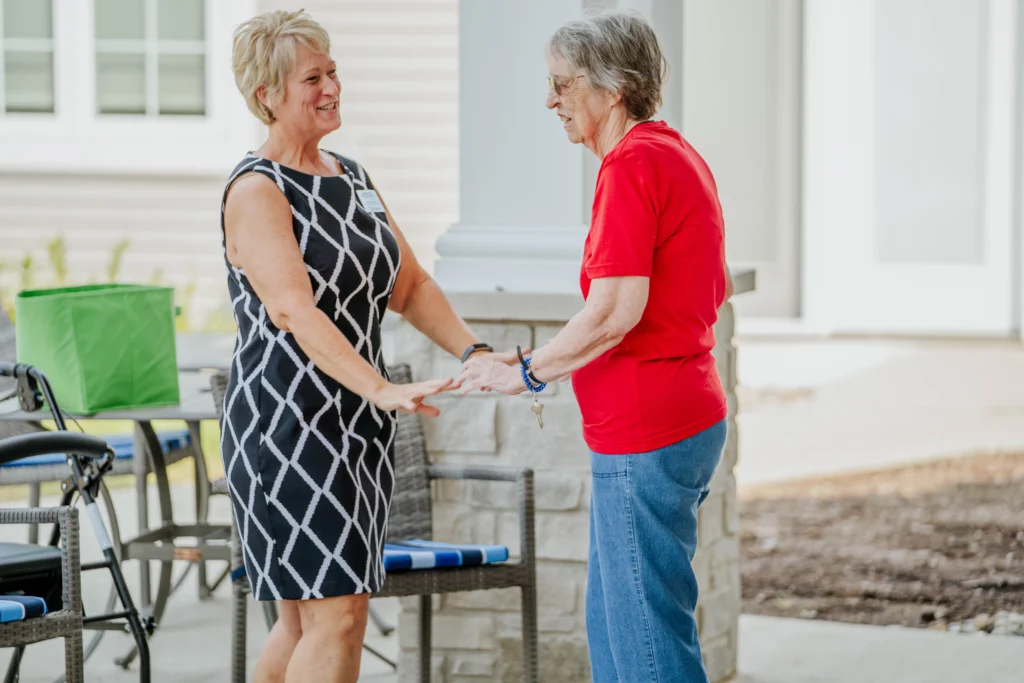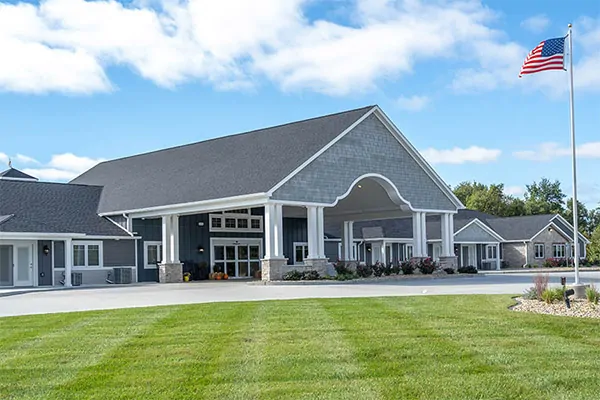SENIOR LIVING
How to Start the Senior Living Conversation With Your Loved One
- Villas of Holly Brook
- February 1, 2024

As our loved ones age, there comes a time when we must consider their changing needs and explore options for their well-being. Initiating a conversation about senior living can be a delicate matter, but it’s an essential step in ensuring the best possible quality of life for your elderly family member. In this blog post, we’ll discuss some tips on how to approach the senior living conversation with empathy, respect, and understanding.
Choose the Right Time and Place
The decision to transition to senior living is a significant life change, and therefore, it deserves a dedicated and thoughtful approach. Family gatherings or events may not be the most suitable times to broach this subject, as they can be filled with distractions and may not provide the necessary privacy for such a personal conversation. Choosing the right time involves considering your loved one’s emotional state and making sure both of you have ample time to discuss the topic without feeling rushed. Broaching the subject of senior living requires a comfortable and private setting. Choose a quiet time when both you and your loved one can focus on the discussion without distractions.
Express Concern and Care
Initiating the conversation with empathy and love is paramount to setting a positive tone for the discussion. By expressing genuine care and concern, you create a foundation of trust that encourages your loved one to open up about their feelings and experiences. Using “I” statements is a key communication strategy that shifts the focus from placing blame to sharing personal observations and emotions. For instance, stating, “I’ve noticed,” emphasizes your personal perspective rather than making it seem like an accusation or criticism. This approach helps your loved one feel less defensive and more willing to engage in a meaningful conversation. It also conveys that your intention is not to criticize or impose decisions but to understand their needs and collaborate on finding the best solution for their well-being.
Incorporating specific examples, such as mentioning observed difficulties with daily activities, helps ground the conversation in concrete instances. This specificity demonstrates that your concern is based on real observations rather than abstract worries. By expressing that their well-being is your primary focus, as in “I want to make sure you’re safe and happy,” you convey a positive intention and highlight the ultimate goal of the conversation – ensuring their safety and happiness. This approach also allows your loved one to recognize that you are coming from a place of love and support, fostering a sense of partnership in addressing their evolving needs. As you navigate this delicate discussion, maintaining a compassionate and understanding demeanor is key to creating an atmosphere where your loved one feels heard and valued, laying the groundwork for collaborative decision-making regarding their future living arrangements.
Be a Good Listener
Creating a space for your loved one to openly share their thoughts and emotions is essential for a constructive and respectful conversation. Be patient and attentive as they express themselves, allowing them the time and space to articulate their feelings. It’s crucial to avoid interrupting, as interruptions can make your loved one feel unheard or rushed, hindering the open exchange of ideas. By demonstrating patience, you convey that their perspective is valued and that this discussion is about understanding their unique needs and concerns.
Encourage your loved one to delve into their fears, preferences, and reservations regarding the idea of senior living. Fears and reservations are often rooted in uncertainties about change, loss of independence, or concerns about the unknown. By providing a supportive environment for them to express these concerns, you allow for a more nuanced discussion that addresses their specific worries. Acknowledge their emotions without judgment, and validate their experiences. This validation reassures them that their feelings are valid and understandable, fostering a sense of trust in the process. Whether they express anxiety about leaving a familiar environment or apprehension about potential lifestyle adjustments, acknowledging these emotions helps create a foundation for finding solutions that address their unique needs and preferences. This compassionate and empathetic approach contributes to a more collaborative and informed decision-making process regarding senior living options.
Educate Yourself and Your Loved One
Conducting thorough research on various senior living options is crucial for preparing the conversation with your loved one. Explore facilities and services in your local area, emphasizing factors like proximity to family, medical facilities, and amenities. Present this information in a clear, non-threatening manner, focusing on the positive aspects of senior living, including engaging social activities, personalized care, and enhanced safety measures. By highlighting the potential for new social connections, enriching activities, and tailored care, you help your loved one envision a lifestyle aligned with their preferences. Providing specific examples of community events and wellness programs paints a vivid picture of a fulfilling and secure living environment, steering the conversation toward the opportunities and advantages that senior living communities offer. This research not only equips your loved one with a comprehensive understanding of available options but also contributes to an informed and collaborative decision-making process, encouraging them to consider the potential benefits and improvements in their overall quality of life.
Want a deeper understanding of the different senior living options?
Discuss the Future
Approach the talk like you’re making plans together, not making a rushed decision. By discussing the future, you give your loved one a say in where they live and let them feel in control. Ask simple questions about what they like, what matters to them, and the kind of life they want. This helps you understand their wishes better. Actively involving them in this planning process shows you respect their opinions and lets them have a say in deciding where and how they live. It’s about working together to figure out what suits them best, making the whole conversation more about their choices and preferences.
Involve Other Family Members
If it feels right, bring other family members into the conversation to make it a team effort. Make sure everyone is on the same page and ready to support whatever decision is made. Having a united front sends a powerful message of support to your loved one, showing that the decision about senior living is a joint effort rooted in care for their well-being. This collective approach helps alleviate any concerns your loved one might have, as they see that the family is working together to find the best solution for them. It reinforces the idea that this is not a decision being imposed but rather a shared commitment to ensuring their safety and happiness in the next phase of their life. This collaborative approach can strengthen family bonds and create a supportive environment for your loved one during this potentially challenging time.
Visit Senior Living Communities Together
Take the initiative to visit local senior living communities together with your loved one. This hands-on approach offers a firsthand experience, allowing both of you to explore the available options and gain a concrete understanding of what life in such a setting entails. Walking through the facilities, observing daily activities, and interacting with staff and residents can provide valuable insights. Encourage your loved one to ask questions and engage with current residents, as hearing about others’ experiences can be reassuring and help alleviate any concerns they may have.
Know what to look for on senior living tours
Broaching the subject of senior living with a loved one is undoubtedly challenging, but it’s a conversation that can lead to improved quality of life, safety, and overall well-being. Approach the discussion with empathy, patience, and a willingness to listen, and together, you can navigate this important decision with the best interests of your loved one at heart.




































